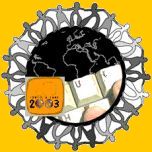

Berichte
Marching On With Renewed Hope
It started with a march through the streets of Dakar, grew with calls for a new global era and is ending with a challenge to activists to take the call for global change beyond the World Social Forum into the world.
(by IPS Correspondents, Inter Press Service News Agency (IPS))
Addressing tens of thousands who marched through the Senegalese capital to mark the start of the Forum, Bolivian president Evo Morales called for a programme of social struggle to build a new world.
“There must be awareness and a mobilisation to put an end to capitalism and clear away invaders, neocolonialists and imperialists [...] I support the popular uprisings in Tunisia and in Egypt. These are signs of change,” said Morales.It was a fitting coincidence that after thirty years in power in Egypt, Hosni Mubarak finally bowed to more than two weeks of mass protest and stepped down on the same day as the Forum drew to a conclusion.
The struggle in Egypt encapsulates many of the issues that were prominent in Dakar: deepening poverty made worse by the global financial crisis; religious conflict threatening a minority; issues of gender inequality bolstered by both culture and the law; and a people alienated from their democratic curtailment of individual rights and freedoms. All this in large measure thanks to billions of dollars of United States support for an oppressive security apparatus.
Former Brazilian president Luiz Inácio Lula da Silva told delegates liberal doctrines imposed on the world’s poorest countries no longer have a place in modern societies.
“In South America, but above all in the streets of Tunis and Cairo and many other African cities, a new hope is being born. Millions of people are rising up against the poverty to which they are subjected, against the domination of tyrants, against the submission of their countries to the policies of the big powers,” said Lula.
In its eleventh year, the Forum remains a space for open and honest debate. Senegalese President Abdoulaye Wade did not hesitate to declare himself a supporter of the market economy which most here reject, and threw down a challenge to participants regarding their engagement with established global institutions such as the United Nations.
“If you who are here, if you had supported the idea, then Africa would already be on the Security Council. Since 2000, I have followed your movement and I still – excuse my frankness – ask myself this question: have you succeeded in changing the world at the global level?”
It’s a challenge that participants in the WSF take very seriously. Kenyan social justice activist Onyango Oloo was a key organiser of the 2007 edition of the Forum in Nairobi; he was unable to attend this year, but he suggested that the building of another world is already begun, away from the fleeting attention of the media.
The WSF is a place where those builders can meet each other directly. Organisers said 75,000 people from 132 countries attended, to share their experiences of injustice and resistance, to test each others’ analyses and return home newly-inspired.
For activist Beverley Keene, from Buenos Aires, holding the forum in Africa was important. “It’s our time to learn from each other and assess the impact that the financial crisis and the looting of the people’s minerals have on livelihoods.”
Lebanese participant Ounsi Daif said he had inspiring exchanges with people from Tunisia and Palestine as well as with students at the university that hosted the WSF. “I discovered the realities of West Africa, which I did not know. I discovered the inequalities, I discovered also the neo-liberal policies, I discovered a lot of things.”
Anietie Ewang, from the Niger Delta, said it had been an eye-opening experience for her. “An opportunity to re-strategise, to take the strategies of all the other participants that you’ve come to know about from their testimonies and go in and continue the fight with all the enthusiasm in the world.”
“The first and most important thing that one can learn from Tunisia is that when the people say no to oppression, then everything is possible,” said Tunisian Azza Chamkhi.
The wide-open optimism of Chamkhi’s statement captures both the broad appeal of the World Social Forum and what is frustrating about it.
“The WSF has a tendency to spin its own wheels, so to speak, because of the inherent limits of its slogan and motto,” says U.S. scholar Joel Kovel, a co-author of the Eco-socialist Manifesto. “’Another World is Possible’, repeated over and over, becomes discouraging because the shape of that other world is never really spelled out.”
Yet the people of Tunisia and Egypt – perhaps like South Africans, Iranians, Chileans, or African-Americans before them – find themselves on the threshold of a new world.
“The dictator is gone, but the dictatorship is still there,” said Chamkhi.
Thousands of activists are departing Dakar to pull it up, root and branch.


